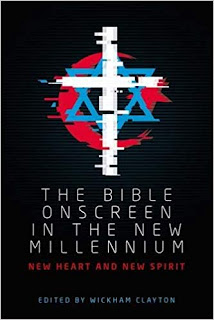Esther and the King - Scene Guide
 I watched Esther and the King back in September last year, when I made the first post of what I thought would be series of three. Well October was a busy month, and the last ten weeks have been pretty hectic, so it got put on the back burner. Now, however, I've finished talking about films about the nativity, and now I'm itching to get back to something from the Hebrew Bible, and so this post's time has finally come! I thought I'd start with a look at the scene breakdown before publishing a review.
I watched Esther and the King back in September last year, when I made the first post of what I thought would be series of three. Well October was a busy month, and the last ten weeks have been pretty hectic, so it got put on the back burner. Now, however, I've finished talking about films about the nativity, and now I'm itching to get back to something from the Hebrew Bible, and so this post's time has finally come! I thought I'd start with a look at the scene breakdown before publishing a review. [extra-biblical episodes]It should be obvious from the above that the film omits a great deal of the biblical material. So Mordecai is not shown saving Ahasuerus' life, neither is he honoured accordingly. Esther does not provide any banquets for Ahasuerus and Haman, nor does she fast and pray before making her plea to the king. The Jews do not fight for a second day and Esther does not request all Haman's son's be hanged.
The King Rejects Queen Vashti - (Esther 1:1-12)
[extra-biblical episodes]
Vashti is Banished - (Esther 1:13-22)
The King's Decree - (Esther 2:1-4)
Seizing of the Virgins - (Esther 2:5-9)
[extra-biblical episodes]
Esther Tells Mordecai - (Esther 2:10-11)
Esther is Chosen as Queen - (Esther 2:12-18)
[extra-biblical episodes]
Haman's Plot to Destroy the Jews - (Esther 3:6,8-9)
Esther Approaches the King - (Esther 5:1-3)
Haman's Plot to Destroy the Jews - (Esther 3:6-7)
Esther Pleads for the Jews (again!) - (Esther 7:1-6)
[extra-biblical episodes]
The King's Second Edict - (Esther 8:8, 11-14)
[extra-biblical episodes]
(Psalm 23 cited)
The Jews Defend Themselves - (Esther 9:1-17)
(Psalm 121:4)
Haman is Hanged - (Esther 7:10)
 In place of all these biblical stories we have a number of ludicrous, and convoluted sub-plots. Haman's murderous intent is stoked solely by his lust for power. When Esther spurns his advances he decides to annihilate the Jews, using the law passed by Dairius which led to Daniel being cast into the Lions Den (Dan 6). Esther, however, convinces the king to relent, leaving Haman to launch a second plot, fabricating evidence to get Mordecai convicted of treason. Esther makes a second plea to Ahasuerus, but it is only partially effective. The decree stands, but will not be carried out until the king returns from checking things for himself. Haman uses this opportunity to try and assassinate Ahasuerus, but when his plot fails, the king sends Simon with instructions to help the Jews to defend themselves.
In place of all these biblical stories we have a number of ludicrous, and convoluted sub-plots. Haman's murderous intent is stoked solely by his lust for power. When Esther spurns his advances he decides to annihilate the Jews, using the law passed by Dairius which led to Daniel being cast into the Lions Den (Dan 6). Esther, however, convinces the king to relent, leaving Haman to launch a second plot, fabricating evidence to get Mordecai convicted of treason. Esther makes a second plea to Ahasuerus, but it is only partially effective. The decree stands, but will not be carried out until the king returns from checking things for himself. Haman uses this opportunity to try and assassinate Ahasuerus, but when his plot fails, the king sends Simon with instructions to help the Jews to defend themselves. The other strange alteration to the biblical story this film makes is in the opening scenes dealing with Queen Vashti. I discussed this to some extent in the "Sexual Politics" post. Essentially Vashti's refusal to come is played sullenly, and linked to her adultery with Haman. Once banished she then comes and performs a striptease. This is a far cry from Vashti's refusal being an anti-war protest in the recent One Night With the King.
 There are a number of citations from elsewhere in the bible. In particular Mordecai recites Psalm 23 as he waits in prison for the destruction of his people. This is one of the most popular parts of the bible to be cited in films. Obviously it appears in most films about David, but also Pale Rider, The Elephant Man, Paradise Road, The Wicker Man, X-men 2 and Ushpiniz and Hitchcock's Lifeboat. It is also parodied in Jarhead and Full Metal Jacket. There are no doubt plenty of others. The film also quotes Psalm 121:4 ("he who watches over Israel will neither slumber nor sleep"), and, as mentioned above, discusses Dairus' edict in Dan 6.
There are a number of citations from elsewhere in the bible. In particular Mordecai recites Psalm 23 as he waits in prison for the destruction of his people. This is one of the most popular parts of the bible to be cited in films. Obviously it appears in most films about David, but also Pale Rider, The Elephant Man, Paradise Road, The Wicker Man, X-men 2 and Ushpiniz and Hitchcock's Lifeboat. It is also parodied in Jarhead and Full Metal Jacket. There are no doubt plenty of others. The film also quotes Psalm 121:4 ("he who watches over Israel will neither slumber nor sleep"), and, as mentioned above, discusses Dairus' edict in Dan 6.Labels: Esther, Scene Guides













0 Comments:
Post a Comment
<< Home